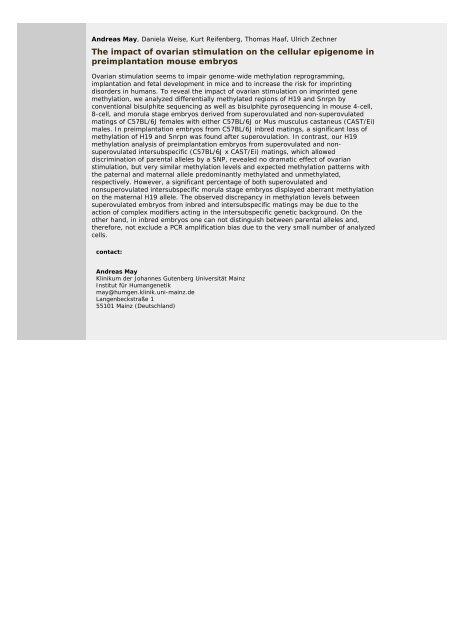Abstracts (poster) - Wissenschaft Online
Abstracts (poster) - Wissenschaft Online
Abstracts (poster) - Wissenschaft Online
Create successful ePaper yourself
Turn your PDF publications into a flip-book with our unique Google optimized e-Paper software.
Andreas May, Daniela Weise, Kurt Reifenberg, Thomas Haaf, Ulrich Zechner<br />
The impact of ovarian stimulation on the cellular epigenome in<br />
preimplantation mouse embryos<br />
Ovarian stimulation seems to impair genome-wide methylation reprogramming,<br />
implantation and fetal development in mice and to increase the risk for imprinting<br />
disorders in humans. To reveal the impact of ovarian stimulation on imprinted gene<br />
methylation, we analyzed differentially methylated regions of H19 and Snrpn by<br />
conventional bisulphite sequencing as well as bisulphite pyrosequencing in mouse 4-cell,<br />
8-cell, and morula stage embryos derived from superovulated and non-superovulated<br />
matings of C57BL/6J females with either C57BL/6J or Mus musculus castaneus (CAST/Ei)<br />
males. In preimplantation embryos from C57BL/6J inbred matings, a significant loss of<br />
methylation of H19 and Snrpn was found after superovulation. In contrast, our H19<br />
methylation analysis of preimplantation embryos from superovulated and nonsuperovulated<br />
intersubspecific (C57BL/6J x CAST/Ei) matings, which allowed<br />
discrimination of parental alleles by a SNP, revealed no dramatic effect of ovarian<br />
stimulation, but very similar methylation levels and expected methylation patterns with<br />
the paternal and maternal allele predominantly methylated and unmethylated,<br />
respectively. However, a significant percentage of both superovulated and<br />
nonsuperovulated intersubspecific morula stage embryos displayed aberrant methylation<br />
on the maternal H19 allele. The observed discrepancy in methylation levels between<br />
superovulated embryos from inbred and intersubspecific matings may be due to the<br />
action of complex modifiers acting in the intersubspecific genetic background. On the<br />
other hand, in inbred embryos one can not distinguish between parental alleles and,<br />
therefore, not exclude a PCR amplification bias due to the very small number of analyzed<br />
cells.<br />
contact:<br />
Andreas May<br />
Klinikum der Johannes Gutenberg Universität Mainz<br />
Institut für Humangenetik<br />
may@humgen.klinik.uni-mainz.de<br />
Langenbeckstraße 1<br />
55101 Mainz (Deutschland)

















